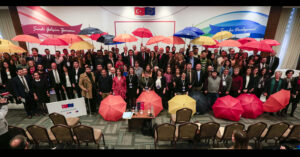
Technical Assistance for Implementation of Civil Society Dialogue and Civil Society Support Programmes (TR2015/DG/01/A5-01/001)
The overall aim of the project is to increase bilateral exchanges and cooperation between CSOs in Turkey and the EU at local, regional and national levels, to promote awareness raising initiatives on importance and benefits of membership of Turkey to the EU within Turkey and EU and on

Technical Assistance to Implementation of Civil Society Support Programme
The overall objective of the project is to support the development of civil society through more active democratic participation in policy and decision making processes and by promoting a culture of fundamental rights and dialogue.

Technical Assistance for Implementation of Human Resources Development Operational Programme (HRD OP 5.1)
There was a need regarding the implementation of the HRD OP for improving the coordination and control of HRD OP, and by assisting the Operating Structure and relevant institutions in the different programming, monitoring, evaluation and implementing tasks. Within this context of the project, the components were aiming

Technical Assistance for Garment Training and Entrepreneurship Initiative (GATE for Women)
Women’s inequality in the labour sector has been an unsolved problem for generations. However, if women find the right support at the right time, it provides excellent results. Likewise, the overall aim of this project was to increase women’s employability and support women’s entrepreneurship by strengthening women’s vocational

Technical Assistance for Result Oriented Monitoring in Turkey-Phase III
Within the scope of this project, we are aiming to ensure efficient and effective of IPA II assistance with a view to better achievement of the objectives set out in the Indicative Strategy Paper of Turkey (2014-2020) and assist NIPAC to fulfil his extended monitoring responsibility.

Technical Assistance for Promoting Social Inclusion in Densely Roma Populated Areas
It’s an obvious fact that there is a need to increase social inclusion in heavily populated areas, particularly in Rome, mainly by facilitating their entrance into the formal labour market. Within this context, the project aimed to support Rome’s population by improving the quality of education delivery, vocational

